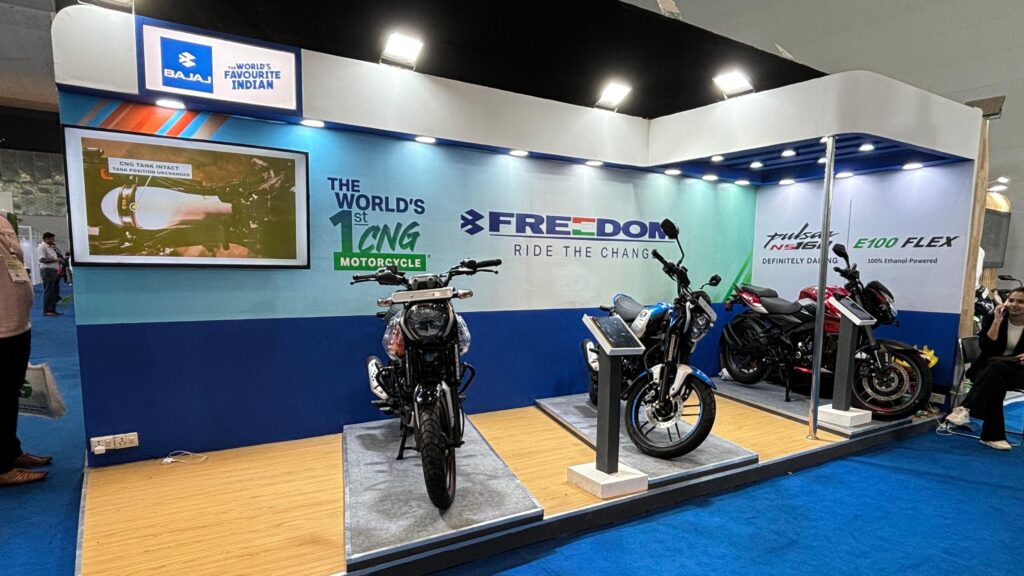The Bajaj Pulsar NS160 is set to take a new leap into the future with the anticipated launch of its flex-fuel variant. As the demand for eco-friendly vehicles grows and the government pushes for greener alternatives, Bajaj Auto is preparing to launch an ethanol-powered version of its popular motorcycle. The introduction of the Pulsar NS160 Flex-Fuel motorcycle is expected to revolutionize the two-wheeler segment, offering Indian riders a more sustainable and cost-effective alternative to traditional petrol-powered bikes.
What is Flex Fuel?
Flex fuel refers to a type of fuel that combines gasoline with ethanol, usually in varying proportions. Ethanol is an alcohol-based fuel, produced from crops like sugarcane, corn, and other agricultural by-products. A flex-fuel vehicle (FFV) can run on a blend of petrol and ethanol, offering a cleaner and greener alternative to traditional petrol engines. The most common ethanol-petrol blend is E85, which contains 85% ethanol and 15% petrol, though flex-fuel vehicles can operate on blends with lower ethanol content as well, such as E20 (20% ethanol and 80% petrol).
The primary goal of flex-fuel technology is to reduce dependence on fossil fuels, lower greenhouse gas emissions, and provide a more sustainable and cost-efficient fuel alternative for consumers. In India, ethanol is primarily derived from sugarcane, making it a renewable resource that can significantly reduce carbon emissions.
Why Flex-Fuel Motorcycles?
India is one of the world’s largest two-wheeler markets, with millions of motorcycles on the roads. As the government promotes cleaner and more sustainable mobility solutions to reduce pollution and achieve energy security, flex-fuel technology has gained traction. Ethanol-powered motorcycles are seen as a practical solution to curb emissions and reduce the country’s dependence on oil imports.
The Indian government has already implemented policies to promote the use of ethanol-blended fuels, such as the National Policy on Biofuels, which aims to achieve 20% ethanol blending (E20) in petrol by 2025. Bajaj’s move to introduce a flex-fuel variant of the Pulsar NS160 aligns with these efforts, supporting the push for greener mobility options.

Bajaj Pulsar NS160 Flex-Fuel: What to Expect
The Bajaj Pulsar NS160 is a well-established model known for its sporty design, performance, and reliability. By introducing a flex-fuel variant, Bajaj aims to make this popular bike even more appealing to eco-conscious riders. Here’s what to expect from the Pulsar NS160 Flex-Fuel:
- Engine Compatibility: The flex-fuel version of the Pulsar NS160 will feature an engine modified to run on both petrol and ethanol blends. This could include blends ranging from E20 (20% ethanol) to higher concentrations like E85 (85% ethanol), offering flexibility to riders in terms of fuel options.
- Environmental Benefits: One of the biggest advantages of a flex-fuel motorcycle is the reduction in carbon emissions. Ethanol is a cleaner-burning fuel compared to petrol, resulting in lower levels of harmful pollutants like carbon dioxide, carbon monoxide, and hydrocarbons. By switching to ethanol-blended fuels, riders can reduce their environmental impact and contribute to a greener future.
- Cost Efficiency: Ethanol is often cheaper than petrol, which can lead to savings at the pump. With fluctuating oil prices and increasing fuel costs, flex-fuel motorcycles can offer a more economical option for daily commuting, especially in rural and agricultural areas where ethanol production is prominent.
- Performance: While ethanol has a lower energy content than petrol, flex-fuel engines are designed to compensate for this difference. Riders can expect similar performance levels in terms of acceleration, handling, and overall riding experience when using ethanol-blended fuels. The Bajaj Pulsar NS160 Flex-Fuel is expected to maintain its reputation for delivering a strong and sporty performance, even with the new fuel system.
Challenges and Considerations
While flex-fuel motorcycles offer numerous advantages, there are a few challenges to consider:
- Availability of Ethanol: One of the key challenges for flex-fuel vehicles in India is the availability of ethanol-blended fuels. While the government is working to increase the production and distribution of ethanol, access to E85 or higher ethanol blends is still limited in many parts of the country. This could affect the practicality of flex-fuel motorcycles in certain regions.
- Fuel Efficiency: Ethanol contains less energy per liter than petrol, which may result in slightly lower fuel efficiency. Riders using ethanol-blended fuels may need to refuel more frequently compared to those using pure petrol.




